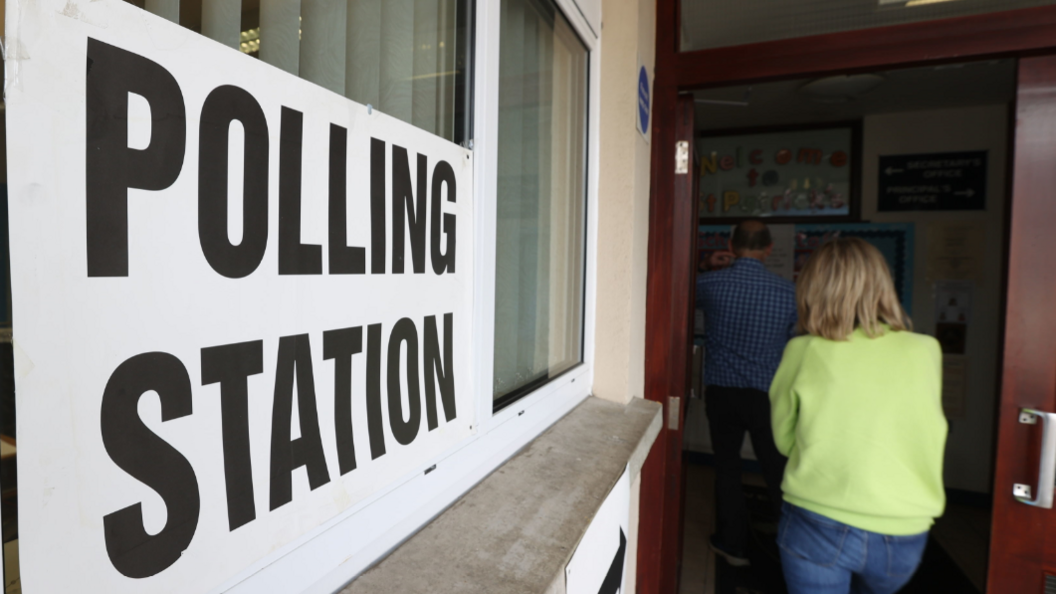Council shake-up sees 18 request election delays

- Published
Eighteen local authorities in England have asked for permission to delay their elections in May to next year in order to implement major reorganisations.
Ministers will make the final decision and not all the requests will be granted.
Speaking in the House of Commons, Local Government Minister Jim McMahon said there would be a "high bar" for allowing delays and the government would aim to make its decisions "by the end of the month or in a couple of weeks at the most".
Under the shake-up of local government, smaller district councils could be merged with local county councils to create single bodies, known as unitary authorities, representing populations of around 500,000.
The government has argued this will create simpler, more efficient ways of delivering local services, but the body representing district councils has warned the creation of "mega councils" could undermine local decision-making.
There have also been concerns about delaying elections to enable the reorganisations to take place.
Alongside wanting local authorities to restructure, ministers want every area of England to have a mayor, to whom they would hand powers.
They want the first of those new mayors to be elected in May 2026 with the areas which have delayed this year's elections voting councillors onto new "shadow authorities".
These shadow authorities would have a year or more to become operational. The government says it expects to deliver the new unitary authorities in April 2027 and 2028.
Half of county councils could see election delay
- Published10 January
Rayner promises mayor for every region of England
- Published16 December 2024
England council shake-up: five ways it could affect you
- Published16 December 2024
The Conservatives' shadow local government minister David Simmonds said he was not surprised that so many councils had requested election delays.
"Why incur millions in costs to local council taxpayers to elect people to councils that are to be abolished?" he said.
However, he warned the government that ongoing uncertainty would also risk wasting money.
McMahon said the government would "only postpone elections where there is a clear commitment" to the aims of the reorganisation, adding that where councils had offered "genuine proposals" for change it would be a "nonsense to have elections for bodies that do not exist".
The minister promised that elections would be held "at the earliest opportunity".
The Liberal Democrats' spokeswoman Vikki Slade said local government needed "significant reform" but expressed concern that local voices would be bypassed by a "top-down diktat" from Whitehall.
Conservative MP Mark Francois said there was "no clamour" in his local area of Essex for the proposals and proposed holding a referendum so the county could vote on whether they wanted to "vote for massive change or remain as they are".
The Brexit-backer joked that "if there is such a referendum - and I never thought these words would pass my lips - I will gladly vote remain."
Reform UK's Rupert Lowe said Americans had fought a war of independence based on the principle of "no taxation without representation" and asked why his local constituents should continue to pay their council tax beyond May if their elections were delayed.
A number of MPs asked what would happen if a debt-ridden council merged with one that had managed to balance the books.
Conservative Kit Malthouse said it would be "profoundly unfair if many, many years of careful stewardship were wiped out by being amalgamated with more profligate neighbouring councils".
Lib Dem MP Will Forster pointed out that his local council of Woking had "racked up" £2.1bn of debt and said neighbouring local authorities were anxious they would have to share the debt in any potential new deal.
He asked how such cases would be handled and whether the government would agree to "write off" Woking's debt.
McMahon joked that it would be "quite career-limiting" for him to agree pay off the £2bn worth of debt without permission from the Treasury.
On the general point, he said the government understood the financial challenges and was working to find a solution but was "not on the point yet of announcing that".
Which local councils have asked to delay elections?
Twenty-one county councils are due to have elections in May. Of those 16 have requested postponements:, external
Derbyshire
Devon
East Sussex
West Sussex
Essex
Gloucestershire
Hampshire
Kent
Leicestershire
Lincolnshire
Norfolk
Oxfordshire
Suffolk
Surrey
Warwickshire
Worcestershire
Two of the ten unitary councils due to hold elections have also requested delays - Thurrock and the Isle of Wight.